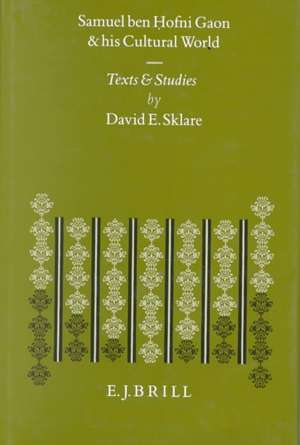Samuel ben ḥofni Gaon and His Cultural World: Texts and Studies: Études sur le judaïsme médiéval, cartea 18
Autor David E. Sklareen Limba Engleză Hardback – 31 mai 1996
The first part of this volume presents the known details of his life and extensive writings and describes the dynamics of contemporary, tenth-century Jewish culture: the decline and temporary restoration of the yeshivot and the intellectual activity outside of them. Additionally, some of the basic concepts of his thought, strongly influenced by Mu‘tazilite Kalām, are explained.
The book provides the Judeo-Arabic text and annotated English translation of two of his works on legal theory, his Treatise on the Commandments and Ten Questions, reconstructed from manuscript fragments from the Cairo Geniza.
Din seria Études sur le judaïsme médiéval
- 18%
 Preț: 1110.86 lei
Preț: 1110.86 lei - 18%
 Preț: 754.86 lei
Preț: 754.86 lei - 18%
 Preț: 1423.78 lei
Preț: 1423.78 lei - 18%
 Preț: 1090.79 lei
Preț: 1090.79 lei - 18%
 Preț: 1661.32 lei
Preț: 1661.32 lei - 18%
 Preț: 871.64 lei
Preț: 871.64 lei - 18%
 Preț: 1250.68 lei
Preț: 1250.68 lei - 18%
 Preț: 935.52 lei
Preț: 935.52 lei - 18%
 Preț: 884.17 lei
Preț: 884.17 lei - 18%
 Preț: 1027.77 lei
Preț: 1027.77 lei - 18%
 Preț: 1639.20 lei
Preț: 1639.20 lei - 18%
 Preț: 898.47 lei
Preț: 898.47 lei - 18%
 Preț: 1793.58 lei
Preț: 1793.58 lei - 18%
 Preț: 678.06 lei
Preț: 678.06 lei - 18%
 Preț: 840.32 lei
Preț: 840.32 lei - 18%
 Preț: 1153.95 lei
Preț: 1153.95 lei - 18%
 Preț: 937.81 lei
Preț: 937.81 lei - 18%
 Preț: 684.55 lei
Preț: 684.55 lei - 18%
 Preț: 706.85 lei
Preț: 706.85 lei - 18%
 Preț: 1175.27 lei
Preț: 1175.27 lei - 18%
 Preț: 806.87 lei
Preț: 806.87 lei - 18%
 Preț: 1129.60 lei
Preț: 1129.60 lei - 18%
 Preț: 725.17 lei
Preț: 725.17 lei - 18%
 Preț: 940.40 lei
Preț: 940.40 lei - 18%
 Preț: 1163.83 lei
Preț: 1163.83 lei - 18%
 Preț: 1351.99 lei
Preț: 1351.99 lei - 15%
 Preț: 442.96 lei
Preț: 442.96 lei - 18%
 Preț: 702.37 lei
Preț: 702.37 lei - 5%
 Preț: 601.24 lei
Preț: 601.24 lei - 18%
 Preț: 551.11 lei
Preț: 551.11 lei - 18%
 Preț: 1238.29 lei
Preț: 1238.29 lei - 18%
 Preț: 759.38 lei
Preț: 759.38 lei - 18%
 Preț: 1238.29 lei
Preț: 1238.29 lei - 18%
 Preț: 1366.84 lei
Preț: 1366.84 lei - 18%
 Preț: 788.41 lei
Preț: 788.41 lei - 18%
 Preț: 793.35 lei
Preț: 793.35 lei - 18%
 Preț: 558.24 lei
Preț: 558.24 lei - 18%
 Preț: 956.50 lei
Preț: 956.50 lei - 15%
 Preț: 519.58 lei
Preț: 519.58 lei - 15%
 Preț: 520.01 lei
Preț: 520.01 lei
Preț: 1418.18 lei
Preț vechi: 1729.49 lei
-18% Nou
Puncte Express: 2127
Preț estimativ în valută:
271.41€ • 282.30$ • 224.06£
271.41€ • 282.30$ • 224.06£
Carte indisponibilă temporar
Doresc să fiu notificat când acest titlu va fi disponibil:
Se trimite...
Preluare comenzi: 021 569.72.76
Specificații
ISBN-13: 9789004103023
ISBN-10: 9004103023
Pagini: 348
Dimensiuni: 155 x 235 x 30 mm
Greutate: 0.86 kg
Editura: Brill
Colecția Brill
Seria Études sur le judaïsme médiéval
ISBN-10: 9004103023
Pagini: 348
Dimensiuni: 155 x 235 x 30 mm
Greutate: 0.86 kg
Editura: Brill
Colecția Brill
Seria Études sur le judaïsme médiéval
Public țintă
Students, scholars and academic libraries with interests in medieval Jewish history and thought, Arabic intellectual history, cross-cultural dynamics, Judeo-Arabic literature, or history of legal theory.Notă biografică
David E. Sklare, Ph.D. (1992) in Post-Biblical Jewish History and Hebrew Literature, Harvard University, is Senior Researcher of the Center for the Study of Judeo-Arabic Culture of the Ben-Zvi Institute, Jerusalem.
Recenzii
Winner of the Ben-Zvi prize 1998.
'David Sklare has painted an arresting portrait of Samuel ben ḥofni and his cultural world; both subject and treatment should compel the attention of a wide scholarly audience.'
Daniel Frank, The Jewish Quarterly Review, 2001.
'David Sklare has painted an arresting portrait of Samuel ben ḥofni and his cultural world; both subject and treatment should compel the attention of a wide scholarly audience.'
Daniel Frank, The Jewish Quarterly Review, 2001.
